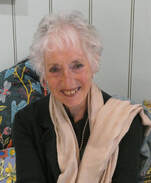
LYNNE NESBIT I have been writing poetry for 48 years, since my second son was born. Before that, in 1966 to be precise, I had already embarked on a search for the “Meaning of Life And All That”. Writing poetry can help a thinker to go beyond thought and the intellectual brain and express their feelings as experienced in the heart brain, or straight from the gut brain, especially those experiences which defy language. Poetry gives one licence to say anything, no matter how improbable or daft it sounds. If you, the reader, don’t understand what I am saying, I shall not be surprised and will happily wait until I can understand what you are saying. Then you and I can share each other’s experiences. There’s so much more to understand!
It follows, therefore, that drawing conclusions about the meaning of life and all that can be a very misleading exercise, so I shall desist. Meantime, I hope you will enjoy reading some of my insights and my delights, and discover how much I appreciate my teachers, many of whom have six or eight legs, have limpid brown eyes and a mane, or fly between my deciduous and otherwise teachers. Other wise beings also appear from time to time in the form of mountains, rivers, moors and even my own bed. And I do not forget the wonderful wisdom of my Teachers, Mentors, Family, Friends and – top of the list – my almost three-year-old Granddaughter (at the time of writing), a young person of great insight and sensitivity.
I thank my lucky stars.
It follows, therefore, that drawing conclusions about the meaning of life and all that can be a very misleading exercise, so I shall desist. Meantime, I hope you will enjoy reading some of my insights and my delights, and discover how much I appreciate my teachers, many of whom have six or eight legs, have limpid brown eyes and a mane, or fly between my deciduous and otherwise teachers. Other wise beings also appear from time to time in the form of mountains, rivers, moors and even my own bed. And I do not forget the wonderful wisdom of my Teachers, Mentors, Family, Friends and – top of the list – my almost three-year-old Granddaughter (at the time of writing), a young person of great insight and sensitivity.
I thank my lucky stars.
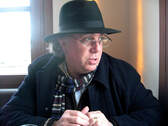
IAN GRIFFITHS was born and grew up in Swansea South Wales and his initial interest in poetry was inspired by the work of Dylan Thomas, fellow poet of that town. As a teenager he had several poems published in collections of new writers and was heavily involved in amateur dramatics. His interest in poetry and literature was encouraged by his English tutor Gwen Watkins, wife of the other Swansea poet Vernon Watkins, and inspired by the nature and bird life of the Gower peninsular where he spent many hours during his youth walking on its cliffs, bays and inhabiting its wild places.
Since making his home Suffolk fouty years ago, Ian has only returned to writing and performing poetry in the last ten years. Since then, and with the opportunities to perform and discuss his work afforded by the many Poetry Café groups in our region, his poetry has blossomed and he has had work published in poetry journals such as ‘Seventh Quarry’ and his first collection entitled 'Conversations With Birds'.
He is a strong advocate of the importance of poetry being heard and is a passionate performer of his work. He is a former chairman of Suffolk Poetry Society and has performed his work throughout the UK, USA and in Ireland and Norway. He is a supporter and previous judge on behalf of the “Poetry by Heart” organisation that encourages the study, appreciation and public performance of poetry by young people.
As well as performances of his own work, he has a one-man performance and talk on the poetry and prose of Dylan Thomas entitled “ Singing In My Chains” which he has performed throughout England.
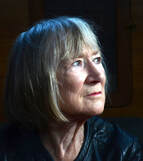
ROSALYNDE PRICE
My love of poetry began early, being taught to memorise and recite poetry for which I received awards from the age of eight. The love of poetry has remained with me ever since, with an appreciation that poetry requires to be spoken well so that listeners may fully receive what the poem wishes to convey.
We studied the craft of poetry at school, which found its use when I began to write poetry in earnest. However, that didn’t happen till later in life, triggered by a personal difficulty. I found that writing poems in neat little blocks on a page kept my feelings at bay.
Following that initial outpouring, I went through a fallow period until, on moving to Wales. I joined a creative writing class where I explored various writing forms. On moving back to Norwich, poetry became the focus of my output and I immersed myself in poetry groups such as Suffolk Poetry Society, helped run workshops and organise poetry reading events.
Currently, I attend the Norwich Stanza and a poetry class both managed by Julia Webb, and help Fred Ellis deal with poetry cafés in Ipswich and Woodbridge, under the banner of Poetry Anglia. I also run my own poetry workshop group.
For me poetry is an aural medium, in composition and when spoken and I hope that comes across in my work. I am often surprised and delighted that people find in my poems elements I had not been conscious of putting there.
This very personal collection of poems forms a bridge between my country and city life. It reveals my truth and perhaps opens others to theirs.
My love of poetry began early, being taught to memorise and recite poetry for which I received awards from the age of eight. The love of poetry has remained with me ever since, with an appreciation that poetry requires to be spoken well so that listeners may fully receive what the poem wishes to convey.
We studied the craft of poetry at school, which found its use when I began to write poetry in earnest. However, that didn’t happen till later in life, triggered by a personal difficulty. I found that writing poems in neat little blocks on a page kept my feelings at bay.
Following that initial outpouring, I went through a fallow period until, on moving to Wales. I joined a creative writing class where I explored various writing forms. On moving back to Norwich, poetry became the focus of my output and I immersed myself in poetry groups such as Suffolk Poetry Society, helped run workshops and organise poetry reading events.
Currently, I attend the Norwich Stanza and a poetry class both managed by Julia Webb, and help Fred Ellis deal with poetry cafés in Ipswich and Woodbridge, under the banner of Poetry Anglia. I also run my own poetry workshop group.
For me poetry is an aural medium, in composition and when spoken and I hope that comes across in my work. I am often surprised and delighted that people find in my poems elements I had not been conscious of putting there.
This very personal collection of poems forms a bridge between my country and city life. It reveals my truth and perhaps opens others to theirs.
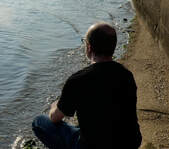
PETER WATKINS
Peter Watkins is a Suffolk Poet living on the Stour Estuary. His working life has been spent in mental health care working as a mental health nurse & as a senior lecturer in mental health. He has published two books on mental health: ‘Recovery’, about the many pathways to equilibrium & living well; and ‘Mental Health Practice’, a guide to compassionate care. In 2003 Peter co- founded the local arts in mental health charity Inside Out Community; the charity works with people wanting to explore the recovery of personal wellbeing through participation in the arts. In his own life creative writing & sculpture have played there part in helping bring peace to an unquiet mind. ‘Enough to Love a Multitude’ is his first published collection of poems. Many of his poetic motifs in the collection arise from the gentle landscape & slow rivers of Suffolk in which he finds divinity, solace, and inspiration. This collection is both personal & universal in its exploration of the vicissitudes of life and the soul’s journey through the archetypal dark wood. It is about the consolation & redemption to be found in nature. Above all it is an invocation of love.
Peter Watkins is a Suffolk Poet living on the Stour Estuary. His working life has been spent in mental health care working as a mental health nurse & as a senior lecturer in mental health. He has published two books on mental health: ‘Recovery’, about the many pathways to equilibrium & living well; and ‘Mental Health Practice’, a guide to compassionate care. In 2003 Peter co- founded the local arts in mental health charity Inside Out Community; the charity works with people wanting to explore the recovery of personal wellbeing through participation in the arts. In his own life creative writing & sculpture have played there part in helping bring peace to an unquiet mind. ‘Enough to Love a Multitude’ is his first published collection of poems. Many of his poetic motifs in the collection arise from the gentle landscape & slow rivers of Suffolk in which he finds divinity, solace, and inspiration. This collection is both personal & universal in its exploration of the vicissitudes of life and the soul’s journey through the archetypal dark wood. It is about the consolation & redemption to be found in nature. Above all it is an invocation of love.

GILLIE HARRIES
GILLIE HARRIES
Gillie is a Suffolk coast born, now Bristol based Poet /Performer. She has been writing since childhood, her earliest influences being the very place of her birth - the sea, countryside and eroding coastline of Suffolk like a metaphor for memory and loss, her Welsh father's love of poetry and her Kentish Mother's gift for storytelling. Language and its breakdown is in Gillie's blood, was central to her first degree and to her professional life. Gillie has been widely published in pamphlet and anthology form, with commissions from Bristol Poetry Can at St George's Hall as part of City of Sanctuary week. Lansdown Poets Anthology 2018, Lansdown Poets Pamphlet, Poems For The Planet 2019 - Gillie enjoyed a twelve-month residency as Poet in the Pool at the Bristol Lido.
She has performed widely across Bristol venues, from Bristol Old Vic Studio to appearing twice on BBC Radio Bristol, to her local Park, as part of Art on The Hill and with Suffolk Poetry Society, of which she is a member, on several National Poetry Days at the Aldeburgh Lookout, in Suffolk.
Gillie is a member of Echoes and Edges music/poetry collective, who have performed widely across Bristol.
www.echoesandedges.co.uk
GILLIE HARRIES
Gillie is a Suffolk coast born, now Bristol based Poet /Performer. She has been writing since childhood, her earliest influences being the very place of her birth - the sea, countryside and eroding coastline of Suffolk like a metaphor for memory and loss, her Welsh father's love of poetry and her Kentish Mother's gift for storytelling. Language and its breakdown is in Gillie's blood, was central to her first degree and to her professional life. Gillie has been widely published in pamphlet and anthology form, with commissions from Bristol Poetry Can at St George's Hall as part of City of Sanctuary week. Lansdown Poets Anthology 2018, Lansdown Poets Pamphlet, Poems For The Planet 2019 - Gillie enjoyed a twelve-month residency as Poet in the Pool at the Bristol Lido.
She has performed widely across Bristol venues, from Bristol Old Vic Studio to appearing twice on BBC Radio Bristol, to her local Park, as part of Art on The Hill and with Suffolk Poetry Society, of which she is a member, on several National Poetry Days at the Aldeburgh Lookout, in Suffolk.
Gillie is a member of Echoes and Edges music/poetry collective, who have performed widely across Bristol.
www.echoesandedges.co.uk
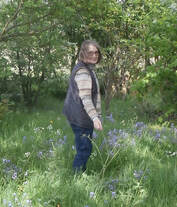
VALERIE DENTON has been writing poetry for most of her life and has performed her poems at festivals, concerts and book launches. Much of her writing stems from meditation (TM) and from her interest in dance and music. She has worked as a creative writing tutor in adult education, which led to anthologies being produced. She also enjoys choral singing and is a member of a local choir. She has been part of an African drumming group in Rendlesham for some time. She has two sons and two granddaughters who have poems dedicated to them. She is thankful to all colleagues, poetry groups, editors and publishers who have helped make this publication possible. This her third book.
DAVE MARTIN
THE SPIRIT OF DAVE
Dave was a lifelong rebel. He did not always follow society’s expectations in his roles as student, teacher, writer or friend. He put his principles before his personal ambitions, and the needs of others before his own welfare.
When he was a teenager Dave bunked off school to follow his own unofficial curriculum at the National Gallery and in public libraries. These early adventures may have influenced his choice and timing of higher education – a combined BA in Art History and English at Leeds University. But Dave only started this after several years working in Lambeth Borough libraries. Once at Leeds, among his teachers there were artists, historians and poets. Dave believed higher education should be an entitlement for everyone and that learning was a lifelong process.
Dave was intending to pursue postgraduate studies when he was interviewed for a teaching post in Norwich School of Art. The job was offered while chatting in one of the city’s 365 pubs. Dave was excited by the new department in complimentary studies he was joining. He nurtured the individuality of each of his students, convinced that was how their creativity would emerge. If the integrity and well-being of teachers and students were threatened by commercial and bureaucratic pressures, Dave took an unflinching stand. He was prepared to forgo promotion for principle.
Dave’s spirit remains very strong today, both in his poetry and art, as well as in the enduring impact he still has on the lives of many people. One of his poems – “Pilgrim” – reminds you how much Dave loved animals too, in this case one of the dogs he and his partner Colette cared for. Dave wrote (in an exhibition note) how much he valued the natural world, from the grand scale of the Pembrokeshire coast to the tiny copse he’d planted and seen mature in Mount Bures. These images appear in his poems and art, and Dave referred to each of them as “a rare moment of harmonious conversation between nature and humans”. For many years he and Colette were involved with the development of their wildlife garden and adjoining field at Old Castle. Dave loved nothing better than to be immersed in the wildlife there, whether with the scythe in hand or sitting for hours watching and listening to the birds – alongside him cups of tea and a book.
The poems and paintings in this collection are a testament and legacy to Dave Martin’s profound and long lasting attachment to the coastal path of Pembrokeshire.
THE SPIRIT OF DAVE
Dave was a lifelong rebel. He did not always follow society’s expectations in his roles as student, teacher, writer or friend. He put his principles before his personal ambitions, and the needs of others before his own welfare.
When he was a teenager Dave bunked off school to follow his own unofficial curriculum at the National Gallery and in public libraries. These early adventures may have influenced his choice and timing of higher education – a combined BA in Art History and English at Leeds University. But Dave only started this after several years working in Lambeth Borough libraries. Once at Leeds, among his teachers there were artists, historians and poets. Dave believed higher education should be an entitlement for everyone and that learning was a lifelong process.
Dave was intending to pursue postgraduate studies when he was interviewed for a teaching post in Norwich School of Art. The job was offered while chatting in one of the city’s 365 pubs. Dave was excited by the new department in complimentary studies he was joining. He nurtured the individuality of each of his students, convinced that was how their creativity would emerge. If the integrity and well-being of teachers and students were threatened by commercial and bureaucratic pressures, Dave took an unflinching stand. He was prepared to forgo promotion for principle.
Dave’s spirit remains very strong today, both in his poetry and art, as well as in the enduring impact he still has on the lives of many people. One of his poems – “Pilgrim” – reminds you how much Dave loved animals too, in this case one of the dogs he and his partner Colette cared for. Dave wrote (in an exhibition note) how much he valued the natural world, from the grand scale of the Pembrokeshire coast to the tiny copse he’d planted and seen mature in Mount Bures. These images appear in his poems and art, and Dave referred to each of them as “a rare moment of harmonious conversation between nature and humans”. For many years he and Colette were involved with the development of their wildlife garden and adjoining field at Old Castle. Dave loved nothing better than to be immersed in the wildlife there, whether with the scythe in hand or sitting for hours watching and listening to the birds – alongside him cups of tea and a book.
The poems and paintings in this collection are a testament and legacy to Dave Martin’s profound and long lasting attachment to the coastal path of Pembrokeshire.
